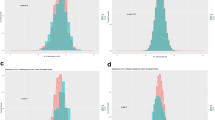Abstract
Tree-based transmission-disequilibrium tests are valuable tools to perform fine-mapping in the search of genetic factors for complex diseases, as they use evolutionary information to relate haplotypes affecting the disease. However, the number of different haplotype trees exponentially increases with the number of markers used, leading to spurious associations due to sample overfitting. If the usual Bonferroni correction is applied to avoid those spurious associations, true risk variants may also be missed. In this work we considered a different solution to avoid sample overfitting of haplotype trees. It consists of dividing the data set into at least two parts and using one of them to choose the haplotype tree which models the disease, and the other one to assess the statistical significance. As a practical example to evaluate the performance of our proposal, we modified the TreeDT algorithm and observed a significant improvement in reproducibility while reducing the type I errors.
Access this chapter
Tax calculation will be finalised at checkout
Purchases are for personal use only
Preview
Unable to display preview. Download preview PDF.
Similar content being viewed by others
References
Bardel, C., Danjean, V., Hugot, J.P., Darlu, P., Gnin, E.: On the use of haplotype phylogeny to detect disease susceptibility loci. BMC Genetics 6 (2005), ALTree
Clayton, D.: A generalization of the transmission/disequilibrium test for uncertain haplotype transmission. American Journal of Human Genetics 65, 1170–1177 (1999)
Clayton, D., Jones, H.: Transmission/disequilibrium tests for extended marker haplotypes. American Journal of Human Genetics 65, 1161–1169 (1999)
Durrant, C., Zondervan, K.T., Cardon, L.R., Hunt, S., Deloukas, P., Morris, A.P.: Linkage disequilibrium mapping via cladistic analysis of single-nucleotide polymorphism haplotypes. American Journal of Human Genetics 75(1), 35–43 (2004), CLADHC
Eck, R.V., Dayhoff, M.O.: Atlas of Protein Sequence and Structure. National Biomedical Research Foundation (1996)
Hellenthal, G., Stephens, M.: mshot: modifying hudson’s ms simulator to incorpore crossover and gene conversion hot spots. Bioinformatics 23, 520–521 (2007)
Abad-Grau, M.M., Medina-Medina, N., Montes-Soldado, R., Moreno-Ortega, J., Matesanz, F.: Genome-wide association filtering using a highly locus-specific transmission/disequilibrium test. Human Genetics 128, 325–344 (2010)
Westfall, P.W., Young, S.: Resampling-Based Multiple Testing: Examples and Methods for p-Value adjustment. Wiley, New York (1993)
Palmer, L.J., Cardon, L.R.: Shaking the tree: mapping complex disease genes with linkage disequilibrium. The Lancet 366, 1223–1234 (2005)
Seltman, H., Roeder, K., Devlin, B.: Transmission/disequilibrium test meets measured haplotype analysis: Family-based association analysis guided by evolution of haplotypes. American Journal of Human Genetics 68(5), 1250–1263 (2001), ET-TDT
Sevon, P., Toivonen, H., Ollikainen, V.: Tree pattern mining for gene mapping. IEEE/ACM Trans. Comput. Biol. Bioinf. 3(2), 174–185 (2001)
Spielman, R.S., McGinnis, R.E., Ewens, W.J.: Transmission test for linkage disequilibrium: The insulin gene region and insulin-dependent diabetes mellitus (iddm). American Journal of Human Genetics 52, 506–516 (1993)
Templeton, A., Maxwell, T., Posada, D., Stengrd, J., Boerwinkle, E., Sing, C.: Tree scanning: A method for using haplotype trees in phenotype/genotype association studies. Genetics 169(1), 441–453 (2005), TREESCAN
Tzeng, J.Y., Devlin, B., Wasserman, L., Roeder, K.: On the identification of disease mutations by the analysis of haplotype similarity and goodness of fit. American Journal of Human Genetics 72(4), 891–902 (2003)
Yu, K., Gu, C.C., Xiong, C., An, P., Province, M.: Global Transmission/Disequilibrium tests based on haplotype sharing in multiple candidate genes. Genetic Epidemiology 29, 223–235 (2005), doi:10.1002/gepi.20102
Zhang, S., Sha, Q., Chen, H., Dong, J., Jiang, R.: Transmission/Disequilibrium test based on haplotype sharing for tightly linked markers. American Journal of Human Genetics 73, 566–579 (2003)
Author information
Authors and Affiliations
Editor information
Editors and Affiliations
Rights and permissions
Copyright information
© 2011 Springer-Verlag Berlin Heidelberg
About this paper
Cite this paper
Moreno-Ortega, J.J., Medina-Medina, N., Montes-Soldado, R., Abad-Grau, M.M. (2011). Improving Reproducibility on Tree Based Multimarker Methods: TreeDTh. In: Rocha, M.P., Rodríguez, J.M.C., Fdez-Riverola, F., Valencia, A. (eds) 5th International Conference on Practical Applications of Computational Biology & Bioinformatics (PACBB 2011). Advances in Intelligent and Soft Computing, vol 93. Springer, Berlin, Heidelberg. https://doi.org/10.1007/978-3-642-19914-1_50
Download citation
DOI: https://doi.org/10.1007/978-3-642-19914-1_50
Publisher Name: Springer, Berlin, Heidelberg
Print ISBN: 978-3-642-19913-4
Online ISBN: 978-3-642-19914-1
eBook Packages: EngineeringEngineering (R0)




